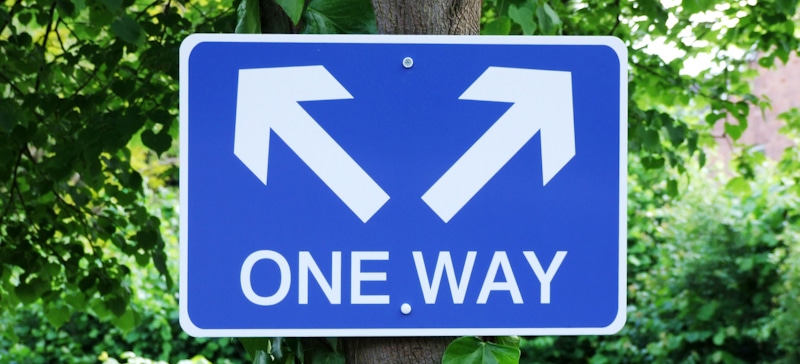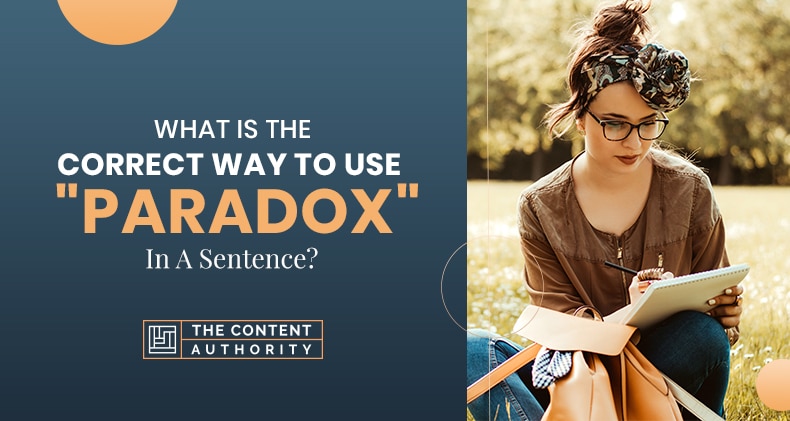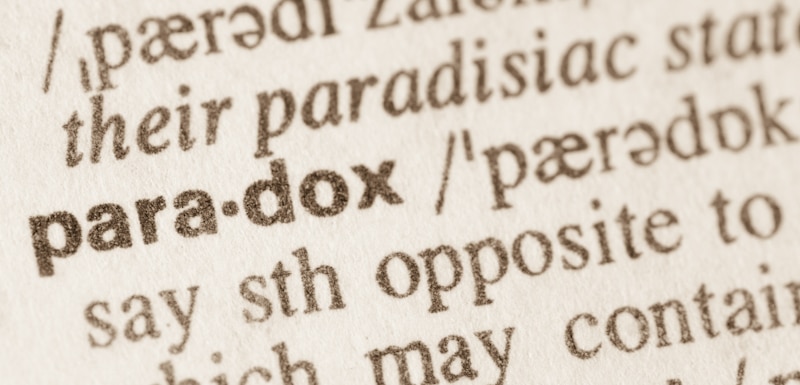Did you know that hundreds of new words are added to the English language every year? No? Well, join the club. In our endeavor to learn more about this intriguing and limitless language, we’ve come across some not so commonly used words, like the word “Paradox.” Let’s take a look at the meaning and definition of this fascinating word.
A “paradox” is a statement that contradicts itself and demonstrates how even when using perfect logic, thinking can still go haywire. A keynote is that a “paradox” still sounds reasonable and is not obvious nonsense, at least until careful consideration is given to the logic used.
“Paradox” – Definition
As we mentioned earlier, a “paradox” is a self-contradictory statement that is true yet false or vice versa. So it’s basically a counterintuitive outcome or an unanswerable question that ultimately leads to a deeper truth.
The Importance of Paradox
For centuries, logical paradoxes have been employed to illustrate the error or imperfection of human logic. Logic may be a priceless tool; however, it still does break down from time to time. Mystics and philosophers make use of paradoxes to reveal that humans have to approach their world by using logic and intuition.
On the other hand, literary paradox helps “art imitate life.” The reality is that the world we live in is chockfull of contradictions, more so when it pertains to people’s personality and behavior. So when a character appears to be a blend of contrasting features, it seems life-like and almost three-dimensional.
This is because most people are paradoxes in some form or way. So by having the main character who is not paradoxical, it may even seem boring or dull to the audience. Paradoxes also bring a certain sense of intrigue and mystery to a story.
Literary Paradox
“I must be cruel to be kind.” (Hamlet)
This is not a logical paradox but instead a literary one. The obvious contradictions here are “cruel” and “kind.” However, it is completely logical to say that a person must be cruel to be kind.
So what Hamlet is trying to say is that you can be cruel to someone in some minor way, so you can be kind in some other, more significant way. Since there is no contradiction of logic, there is also no paradox. Hamlet, however, brings together varying aspects of cruelty and kindness, which leads us to believe that his personality is loosely paradoxical.
Logical Paradox
According to Chinese folk law, there once was a Blacksmith who created state-of-the-art weapons and armor. The spear he created could pierce absolutely any object, and the shield he made had the ability to fend off any attack.
One day, a young man asked him what would happen if someone attempted to pierce the shield using the spear he had made, and he realized that he couldn’t answer that question. So the Chinese character for “paradox” is depicted as a shield with a spear next to it and it’s all because of this story.
Related Terms
Irony
Irony is defined as a circumstance or event that infringes on our assurance. However, it is not a logical paradox because there is no contravention of logic. This is a recurrent mistake!
For instance, if an ethics professor was found to be stealing money from his students, it would be ironic for obvious reasons. The apparent reason is that the professor teaches young people or students about “ethics”, so there is an enormous expectation that the professor is or would be an expert on doing the right thing, and consequently would not be stealing, which is wrong. However, the professor is what we call a literary paradox because his personality merges two contrasting features: mastery in ethics and ineptitude to behave ethically.
Dilemma
If you’ve ever mistaken a paradox for a dilemma, you’re not alone. While it’s a frequent mistake, these two words have contrary meanings. A paradox is an infraction of logic, while a dilemma is an arduous or burdensome choice. In a dilemma, conflicting desires or needs may arise; however, those desires are sensibly reconcilable, so there is no logical paradox. Since the dilemma contains two feasible states of affairs and not one clear-cut situation, no literary paradox exists either.
Example: A single dad is not content with the amount of money he is earning and wants to give his children a better life. To do this, he needs a better-paying job, which also means he needs to go back to school, although it will mean spending time away from his children.
So the dilemma here for this single dad is whether he should spend more time with his children or go back to school so he can get a better job and hence, give his children a better quality of life? This wearying and enigmatic choice is what we call a dilemma. However, neither a literary paradox nor a logical paradox exists in this circumstance.
Self-Fulfilling Prophecy
Self-fulfilling prophecies are often confused with time-travel paradoxes since the latter is frequent in popular culture. The rudimentary distinction is which direction you are proceeding. Only traveling back in time can create a paradox since the future does not contain logical consequences and is considered open. On the other hand, moving forward in time has the ability to create a self-fulfilling prophecy.
Time Travel Paradox:
In preparation for assassinating Hitler and putting a stop to the Second World War, a time traveler from 2030 builds a time machine. His mechanism is successful, and this means that the war didn’t actually occur, and the time traveler (in 2030) never had any reason to manufacture the time machine, to begin with, which consequently means that Hitler was on no account assassinated.
Self-Fulfilling Prophecy:
A scientist gets a glimpse of a terrible apocalypse upon prying into the future. Upon his return, he attempts to forewarn humanity, but people make a mockery of him to his dismay. This, of course, sends him into a rage, and he turns on them with his gadgetry, hence bringing about the very obliteration that he observed in the future. This story is not a paradox since no part of this narrative contradicts or makes itself unattainable.
Oxymoron
An evident paradox that can be deviated through the double entendre or puns is known as an oxymoron. “Jumbo shrimp” for instance, is an oxymoron. If shrimp necessarily meant “something small”, it would be a paradox. However, shrimp is also a specific animal, and therefore, the obvious paradox is merely an illusion. At the same time, the term “a poor man of great wealth” seems to be a paradox, although the contradiction soon dissipates when we come to the realization that the “wealth” is not money, and rather, moral, spiritual, and intellectual fulfillment.
Juxtaposition
Juxtaposition is referred to as placing two or multiple contrasting features or elements next to one another, although it may constitute the extensive definition of literary paradox. One of the acclaimed images of juxtaposition depicts a group of anti-war demonstrators enveloped by soldiers focusing guns at them. One man in the crowd is placing flowers in the barrel of each rifle. So in this example, brute force in the face of innocuous tenderness of flowers, reveals the merging of differing elements and is what we call a literary paradox.

Example Sentences with the Word “Paradox”
- To forsake this certainty may leave us with a skeptical paradox that is sincerely depressing.
- The paradox of scient is simply that its success in comprehending nature has produced issues for its understanding of human nature.
- The position approaches paradox and is highly unlikely to be accepted.
- A complicated issue is an individual freedom in a time of individual helplessness.
- She was blessed with a secure sense of humor and a love of paradox carried to the utmost.
- Fallacy soon becomes wearisome and paradox, stale.
- The paradox of Fredericks’s Crusade is nothing short of amazing.
- To see the ridiculousness of the second paradox is easier than to disprove it.
- The deepest truth of our spiritual life is also the paradox.
- I recall hearing about the grandmother paradox.
- This type of time travel produces a paradox that demoralizes time travel into the past.
- All in all, she was a paradox of fashion.
- The teacher used the paradox that no one, knowing good, would do bad.
- What is the source of this paradox?
- Where does this paradox come from?
- Some vigorous forms of yoga may lead to a better quality of sleep and this is a paradox.
- The paradox is at the heart of things.
Conclusion
Some of life’s most significant truths are conflicting on the surface. Although they seem like futility, experience proves them to be apparent or obvious time and time again. This is because the real grains of wisdom only emerge when you take a look beneath the surface of a paradox. So now that you understand exactly what a paradox is, we hope you’ll be using it more adequately in your writing.
Shawn Manaher is the founder and CEO of The Content Authority. He’s one part content manager, one part writing ninja organizer, and two parts leader of top content creators. You don’t even want to know what he calls pancakes.



